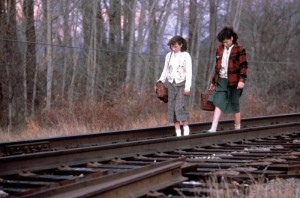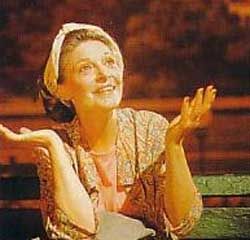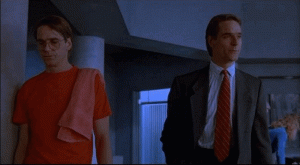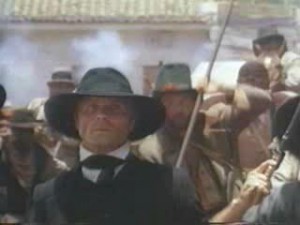From the Chicago Reader (December 23, 1988). — J.R.
The Puttnam Problem
Some of the year’s most ominous film-industry developments followed directly from the forced departure of David Puttnam as head of Columbia Pictures. During his brief and controversial tenure at Columbia, Puttnam — the outspoken Englishman who produced Chariots of Fire and other “quality” films — had attempted to reverse the overall trend in Hollywood of assigning more power and artistic control to stars and less to directors and writers by developing low-budget projects that weren’t completely subject to the whims of stars and their agents.
After Puttnam’s departure, the desire to discredit his strategies at Columbia was so pronounced that most of his projects were deliberately sabotaged through a flagrant lack of promotion — demonstrating once again that the major aims of Hollywood are often not so much the making of money as the fulfillment of various personal forms of vanity. (Bill Forsyth’s Housekeeping is a good example of the sort of serious Puttnam project that was virtually foredoomed at the box office by the pressure of anti-Puttnam sentiments.) Adding insult to injury, a series of anti-Puttnam articles appeared in the trade magazine Variety, which attempted to appease Puttnam’s enemies by demonstrating that his films were commercially unsuccessful, conveniently overlooking the fact that very few of them were given even a sporting chance to succeed.
Hooray for Broadway
It seems grimly significant that the two most accomplished “serious” commercial films to have emerged so far at year’s end, both scheduled to open this week, are adaptations of New York stage productions, Torch Song Trilogy and Talk Radio, whose true auteurs are their playwrights/screenwriters/lead actors — Harvey Fierstein and Eric Bogosian, respectively — rather than their directors, Paul Bogart and Oliver Stone. Last Christmas season we had such personal and ambitious movies as The Last Emperor, Broadcast News, Housekeeping, Wall Street, and Empire of the Sun; this year, their only apparent equivalents are Broadway or off-Broadway imports.
Empty Spaces
By and large, it was a year characterized by technological achievements and refinements, particularly the elaborate doubling techniques that yielded two Lily Tomlins and two Bette Midlers on screen at once in Big Business, Jeremy Irons playing a pair of twins in Dead Ringers, Eddie Murphy impersonating a whole group of barbershop regulars in Coming to America, and Bob Hoskins interacting with animated characters in Who Framed Roger Rabbit. These roles obliged each actor to speak to empty space before the special effects were added, and the results were decidedly mixed. In the cases of Tomlin, Midler, and Murphy (the latter in multiple disguises), it seemed too often to be empty space that was speaking to the actors rather than the other way around. Irons, on the other hand, offered the year’s most astounding actorly tour de force by interacting with himself so seamlessly that, by around the halfway point in Dead Ringers, it was possible to tell which twin was which in a matter of seconds. And Bob Hoskins did a very persuasive job on his own in convincing us that Roger Rabbit was more than just a gleam in animator Richard Williams’s eye.
Political Messages
Politically speaking, it was a year of confusion at the movies, as it was elsewhere. The best ethnic movie, School Daze, as well as the worst, Coming to America, both bristled with contradictions — neither had the clarity of last year’s Born in East L.A., for instance — and the overt political concerns that last year yielded a live-action cartoon of the left (Walker) this year gave us a live-action cartoon from the right (Patty Hearst).
Insofar as the confusion of certain movies reflected the mixed messages of diverse politicians, one could tick off a number of them as emblematic of various candidates’ images. Scrooged offered the best case for George Bush by summoning up a thousand points of glitzy neon light, and a view of the homeless and powerless that reeks of show-biz piety. Big — the last and only successful entry in an extended cycle about teenage boys swapping bodies with their family elders — anticipated Dan Quayle by wistfully imagining what it would be like if grown-ups behaved more like kids. Running on Empty, which dealt with 60s values in hiding, suggested some of the muddled cross-purposes of Michael Dukakis, while Tucker‘s old-fashioned humanist brand of capitalism suggested Lloyd Bentsen. They Live was so split between anti-Reagan yuppie bashing and xenophobic gook exterminating that it appeared to be arguing for something like a Dukakis/Quayle ticket. If Jesse Jackson’s values were visible anywhere in movies, it was in the Rainbow coalition of John Waters’s Hairspray. The superiority of Arnold Schwarzenegger as a Soviet cop over Jim Belushi as an American cop in Red Heat represented Hollywood’s response to glasnost and an opening thaw in Cold War attitudes, but if any film represented radical subversion from the heart and soul of the mainstream, it was the rerelease of 1962’s The Manchurian Candidate. And following the lead of Cahiers du Cinema’s Bill Krohn, if any film this year told us something important about the roots of contemporary fascism, it was George Romero’s brilliant and neglected Monkey Shines: An Experiment in Fear.
Perhaps the most interesting exercise in political futility was the holding up of the distribution of Julian Temple’s explicitly anti-Bush disco musical comedy Earth Girls Are Easy — shown to much acclaim at the Toronto Festival of Festivals in September — until some unspecified date after the presidential election and inauguration, a decision that was apparently due in part to legal disputes over distribution rights. Fortunately, the corrosive anti-Bush and anti-Reagan documentary Coverup: Behind the Iron Contra Affair was shown before the election, and in general the most lucid political statements in film this year took a documentary form: Jon Jost’s Uncommon Senses and Marcel Ophuls’s Hotel Terminus: The Life and Times of Klaus Barbie are two of the more outstanding examples. By contrast, docudramas such as Betrayed and Mississippi Burning probably wound up confusing more issues than they clarified; and perhaps nothing was more muddled than Clint Eastwood’s efforts in The Dead Pool to use his Dirty Harry to decry the public appetite for movie violence, in between his own bouts of mayhem.
Jesus Sells
One of the year’s most striking anomalies was Martin Scorsese’s The Last Temptation of Christ becoming an unwitting fund-raiser for the religious right. The irony of this turn of events was that the nationwide clamor of certain conservative religious groups, including picket lines and other demonstrations, only helped to boost the box office sales for the first few weeks of the film’s run. But if the hysteria helped to make some coin for both fundamentalists and Universal Pictures, it also probably created the worst possible critical climate for judging the film on its own merits.
Foreign Affairs
One of the most hopeful signs of the year was the commercial success of Wim Wenders’s trilingual Wings of Desire, if only because the popularity of subtitled films in the U.S. has never been lower. According to Rob Medich in the December issue of Premiere, the grosses for foreign-language films in 1987 “accounted for less than one-half of 1 percent of the $4 billion in movie ticket sales in the United States.” Medich went on to quote film school teacher Arnie Baskim: “Americans are only interested in themselves. So they’re only interested in foreign films if there’s an American lead in the foreground and a foreign locale in the background.”
This profound lack of curiosity about the rest of the world has probably been exacerbated by the growth of the so-called American “art” movie since the 70s, which has generally crowded out the foreign market by offering the derivative artiness of an Allen, Spielberg, or Cimino over the works of their overseas masters.
One interesting offshoot of this problem is that foreign spectators have more choices than we do about what to see, even when it comes to American movies. (This has been true for some time in France, where Hollywood classics are revived with much more frequency and seriousness than over here.) An interesting case in point is the very successful career of Fatal Attraction in Japan. While the version of the movie that American audiences saw has already racked up 1.7 billion yen, the original version with a different ending — Glenn Close stabbing herself to death, and Michael Douglas being arrested for her murder — which displeased U.S. preview audiences, is also currently showing in Tokyo, and has so far made 12 million yen.
Voices in the Wilderness
American independents are currently experiencing a serious crunch for pretty much the same reason that foreign films are becoming more scarce: the studio majors are forcing them off the market. The media, of course, play a complicitous (and wholly undemocratic) role in this process. The sort of hoopla that routinely accompanies even many of the worst studio releases — including junkets for the press, guest appearances on Today, Carson, Letterman, etc, promotional shows on cable, and up-front treatment by TV and newspaper reviewers — is almost never given to low-budget independent efforts, no matter how good or important. Compare the minuscule amount of attention paid to a Jon Jost film or Coverup or Patti Rocks next to the monolithic fanfare that greets a piece of tripe like Arthur 2: On the Rocks. Instead of free and equal products competing in the marketplace, we have the sound of a mosquito struggling to be heard over the electronic amplification of the takeoff of a super-jet.
In response to this impossible situation; a group of independents from Spokane, Washington, are currentIy trying to hawk their low-budget comedy Only a Buck by driving cross-country in a brick mobile home and selling their feature on tape to video stores. I haven’t seen the film (although I have looked at the slick promotional preview, which recently turned up at the Reader inside a pizza box), but I note for what it’s worth that the group is in Chicago for the remainder of the year, and interested readers can contact them on their cellular phone by dialing 659-7626 (pause) 509-994-1469; producer-writer-director Gerry Cook, star and art director Charlie Schmidt, actor-writer Don Moulton, and/or actor-composer Peter Hunricks will be there to tell you more.





